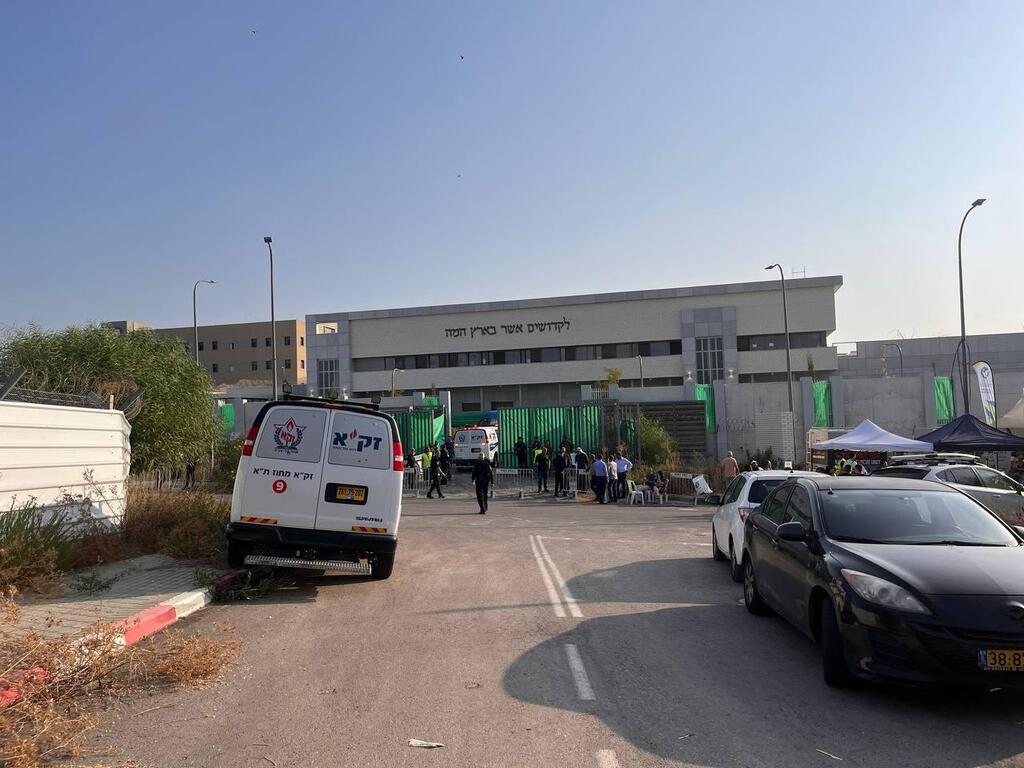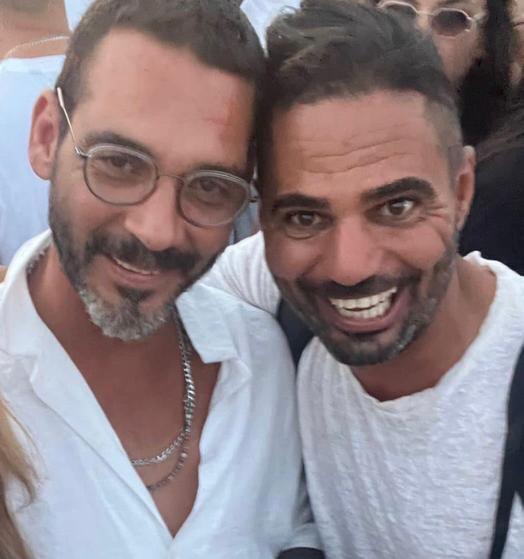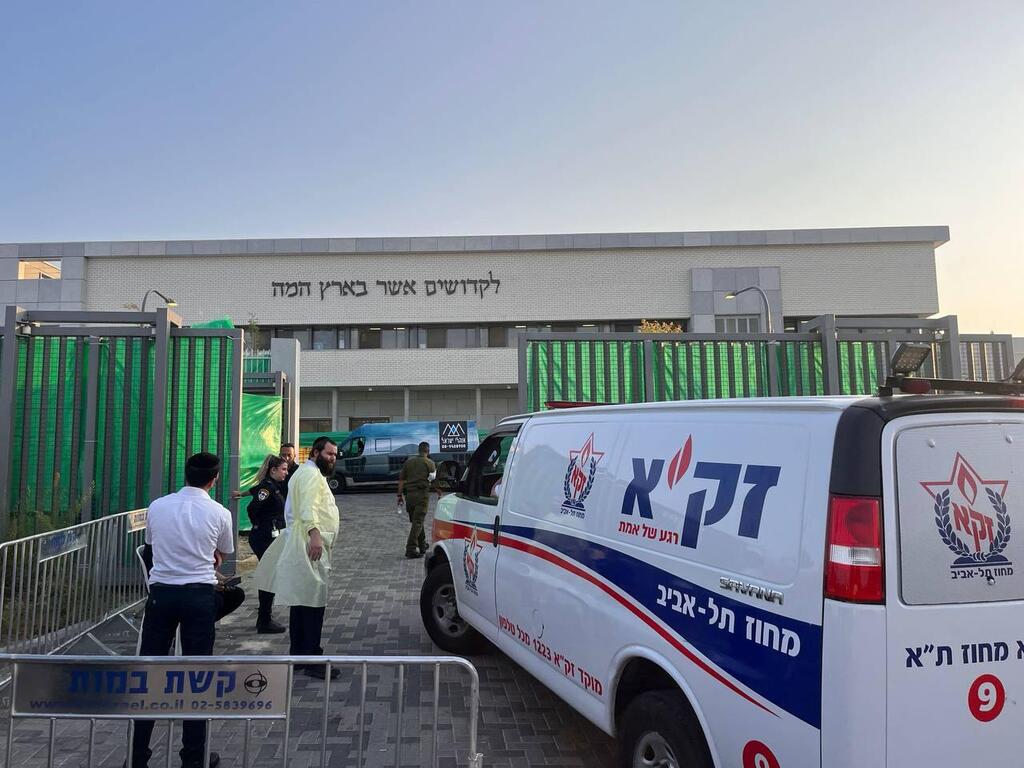Liz, whose son Shachar Ben Na'im was murdered in Hamas’ horrendous offensive against Israel last week, has been waiting at the IDF Rabbinate facilities in Camp Shu'ra near Ramla since Saturday, following Hamas’ raid on the music festival near Re’im.
More stories:
Sharing her recounting of the events on Tuesday, she spoke about the last conversation she had with Shachar at 8:45am, "Shachar arrived at the after-party in Re’im at 6:00 in the morning. When we talked, he told me terrorists were shooting at them; he saw his friends, who were with him in the car, being killed before he escaped from the vehicle into a forested area."
The person who identified Shachar’s body was a close friend of his, a ZAKA emergency services volunteer who happened to see it. "Shachar's sister directed ZAKA to the location he managed to send them," she says.
"His friend sent us a picture of him lying on the ground dead, and we’ve been here ever since. They told me that his body would be recovered and brought to us in an hour, but something isn’t working right here. Ambulances full of bodies keep arriving. They’re labeled with a number and a region. They brought Shachar’s body from Mefalsim. I have his personal number, but no one is willing to deliver his body to me. I keep begging them to let me go in and identify him. I’ve seen his picture."
According to her, one of the problems is that the bodies were transferred from trucks to containers and mixed up. "Shahar is married, he has two children aged 13 and 10, his wife is pregnant," she says. "I'm begging you, let me take him from here and bury him."
At the entrance to the base, a tent city was set up with refrigerated containers, where they are working on identifying most of the bodies. If it is one of the more complex cases to identify, or if it is an IDF soldier, the body is transferred to the base's permanent facility for identification. The rabbinate conducts an initial identification procedure for each body - DNA tests and additional photographs. In the second step, they check compatibility with the various state databases or with a DNA test of a relative. In the end, there is another process with the police of issuing a burial license.
Sitting next to the Ben Naim family is Ortal, the sister of the former international soccer star Lior Assoulin who was also murdered at the party. Shahar and Lior were good friends and arrived there together. "Shahar texted with his mother and told her that Lior died in his hands," says Ortal. "The childhood friend who volunteers at ZAKA recognized both of them, he even sent us a photo of Lior."
She pulls out her phone and shows the picture. His face is without a scratch and his ID card is placed on his chest. "We have been here for three days, sleeping on the floor," she adds. "We can recognize him in an instant. We came the most organized, with documents, but there are ego wars here. We met Zaka volunteers here that this is their job. They have been asking for two days to come in to help and they are not allowed. Everyone is doing God's work, but there are ego battles here at our expense. 100 or so people on more than 1,000 bodies and the trucks continue to flow."
'I'm not leaving without Ariel'
On the large building where the identification process is carried out, there is a huge inscription. "To the saints who are in the land of them". A large white tin gate at the entrance is opened every now and then and Home Front Command soldiers, social workers and volunteers who try to reassure the families and answer questions, come out. They don't have many answers. They mostly explain that this is a complex process and suggest families be patient and go home.
"I can't move from here," says Shoshana Biliya, whose husband Ariel was murdered on Saturday in Ofakim. "The dog barked and alarms started going off. We ran to the shelter outside because we don't have an ambulance. The children were really scared and asked to go to their grandparents who live two houses away from us. My husband's brother and his family were also there.
"Suddenly shots started and we all went up to the second floor, closed doors and windows. Ariel and my brother-in-law went to look from the window of the front room upstairs, they came back and said they saw two people in uniform shooting at a policeman who shouted to them that he was Jewish. We called the police and there was no answer, suddenly we hear them inside the house, outside the door and speaking in Arabic. Ariel decided that we should escape through the window to the roof of the warehouse because one of them went to flank the house. We all jumped with the children. Ariel remains last. He took an iron rod and said that if they come, he will stop them."
The Biliyas fleeing their home
His mother's leg got stuck, and Shahar managed to free it at the last second, but did not have time to get out of the window himself and was shot to death, as recorded by the neighbors' security cameras. "We've been here since yesterday," says Shoshana. "We realized that more than 1,000 bodies have already arrived and only a few staff members are not prepared. Those who work here are really doing everything they can, but the load is probably too great. I'm not leaving without Ariel."
It's like the third world, we lost control
Similar claims are heard from the family of Sami Algargaoui, a driver working near Be'er Sheva, who was murdered near Sderot, where transportation workers work in the morning. They have also been here for three days.
"We saw a video of him being shot in a car with his head down," they say. "We called the police but we realized that they didn't really intend to do anything, so someone from the family drove there at the height of the chaos on Saturday. He managed to get within 100 meters of the car. It was at six in the evening, 12 hours later. He saw Sammy there sitting in the exact same pose as In the video. We realized he was dead."
Since then they have been here, sitting and waiting. "There is an insane amount of bodies. We are here at the gate, counting all day, and too few bodies are coming out. At this rate, it will take them weeks, even months. We know that Sammy is dead and can identify him and move forward, but there is no one to talk to. We are only told that it is complicated, like a broken record. They tell me to go home and have them call, but we don't want to go. There are professionals here from the field who want to help, Zaka guys who work on this day-to-day came here and offered help. Sent them and they are not allowed.
"In a reformed country there can be no such thing. We are told that there is a lack of equipment. So bring it from abroad. There is complete uncertainty here. Third world, loss of control. We do not have complaints against, God forbid, the amazing people who work here around the clock. They are angels. But help them, bring in more personnel, stop tormenting the families. Today 20 families are sitting here, tomorrow 200 and the day after 600."
Moshe, an ultra-Orthodox resident of Bnei Brak and a reservist of the Chief Rabbinate, is coming off an 18-hour shift. His face says it all. On the way to the car he can barely open his eyes. "I am here from Shabbat in the evening in shifts," he says. "I don't want to expand on what we do inside because of individual modesty, I'm just saying that it's hard work that never ends and people work with dedication."







